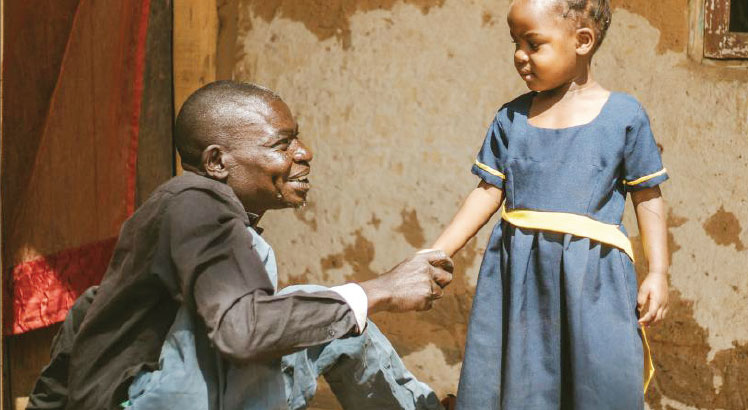P
recious Nkhanizimatha Chunga, 44, was born in Chilowamatambe Village, Kasungu. His life changed completely in 1982 when he contracted polio aged six. His limbs suddenly but permanently felt paralysed.
Chunga believes that without effective health awareness campaigns, coupled with the fact that polio was still new then, his parents acted on the little light.
He explains: “They mistook it for some spell cast by witches just as you would expect the thinking of that time.
“As it eventually proved to be, the family wasted precious time, three years to be precise, probing from one witch doctor to the next when it had been polio all along.”
Chunga wants every child to be vaccinated against polio
Chunga would soon be diagnosed with polio when the Malawi Against Polio (MAP) visited the village with vaccination campaigns.
“The news felt like a heavy blow to me,” he recounts. “It was more of a psychological blow than it was physical.”
Here was a child who had been walking and playing football with his friends. Suddenly, he had to go back crawling for his mobility.
Chunga said: “To make matters worse, when my mother died in 1984, my relatives refused to take me under their custody. They took me for a burden as I was not able to walk by myself or do any household chores. To them, I was useless; as good as dead!”
Chunga was successfully operated on that same year. The surgery helped restore the sense of touch to his limbs, but the damage was already done on the physical side.
However, moving from one family to another disturbed his learning. Chunga dropped out in Standard Five in 1994.
“There simply was no one to be ferrying me to and from school,” he recalls.
Besides, he said, he was past primary school going age.
He has never been to formal school since.
With his wheelchair as the only true companion, he arrived at Kasungu Town from the village for greener pastures.
“Still bitter from how I had been treated by my own people back home, I decided to prove to the world that I was and would still be useful in life,’” he said as we drove towards Gundani, a township within the municipal where he has settled.
He has been married to his wife Sheila since 2002. They have a three-year-old child.
“When I started earning a little something,” Chunga said, “I decided to start saving immediately. I had always wanted to own a house. I’m glad to say this is one of the many to come.”
Back in his home village, the cobbler claims to own herds of sheep, goats and chicken from the same business.
“Interestingly, I am also able to support the very same relatives who abandoned me when I was a nobody; when I needed them the most.”
Today, he also runs a video showroom where he beams football matches with foreign league games fetching as high as K500 per head.
“The plan now is to build a modern house for my wife and my kids. This one is old,” he says.
To some extent, Chunga believes following all measures prescribed to him by the doctors back then increased his chances of survival.
“Although my legs have remained paralysed to this day, I recovered from the infection. Nevertheless, it’s not a pleasant experience. Trust me, it’s hell. I wished my parents knew better then. This is why I’m encouraging parents to take this immunisation campaign seriously,” he emphasises.
Sheilla, obviously his favourite, was immunised against the disease earlier that day by health officials from the district hospital.
“I would do anything for my children. My family means everything to me,” is Chunga’s parting shot when we dropped him back at the flea market, just in time for the communal m’memo.
Dr. Ghanshyam Sethy, Health Specialist Unicef highlighted that Polio vaccine is sole effective strategy to prevent future generations from this disease.
The post Kasungu polio survivor regrets vaccine ignorance appeared first on The Nation Online.
 Moni Malawi
Moni Malawi 
